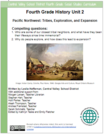
The unit has two parts. In each, students dive into inquiry to answer the compelling questions:
1. Who are some of our closest tribal neighbors, and what have they been their lifeways since time immemorial?
2. Why do people explore, and how does this lead to expansion?
Part 1 is focused on the examination of the northwest and some of the original inhabitants. Through these questions students will learn about the culture of some of their closest tribal neighbors, the Spokane Indians. The final project for Part 1 is a cultural investigation display, in which students will show what they know about the culture of the Spokane Tribe.
In Part 2, Students will also learn about forces that brought change to the northwest: fur trade era and exploration. Students will ultimately learn about the Corps of Discovery and the Oregon Trail and know the impact each had on the west. Students will finish Part 2 with a timeline activity that will reflect choice and build upon student strengths according to their skill set.
Finally, a lesson on a Tribe of the Columbia Plateau is offered as an extension, but it is strongly recommended that students get to experience this lesson.
Note that the emphasis here is on the Spokane Tribe as one of our closest tribal neighbors. In no way is this an exhaustive study nor should the tribal cultures be generalized to other tribes of the region. We understand that each tribe in our region and North America was and continues to be unique in its culture, practices, lifeways, and traditions.
- Subject:
- Cultural Geography
- Economics
- Education
- Elementary Education
- English Language Arts
- History
- Reading Informational Text
- Social Science
- U.S. History
- Material Type:
- Activity/Lab
- Assessment
- Case Study
- Diagram/Illustration
- Interactive
- Lesson
- Lesson Plan
- Module
- Primary Source
- Reading
- Simulation
- Student Guide
- Teaching/Learning Strategy
- Unit of Study
- Author:
- Leslie Heffernan
- Date Added:
- 10/23/2019
